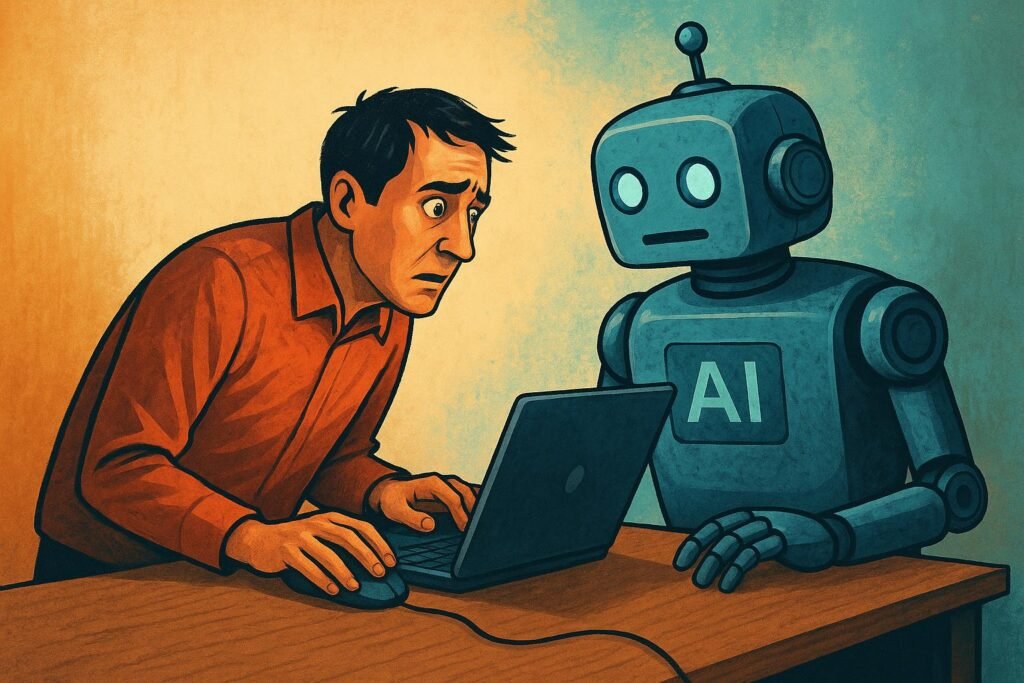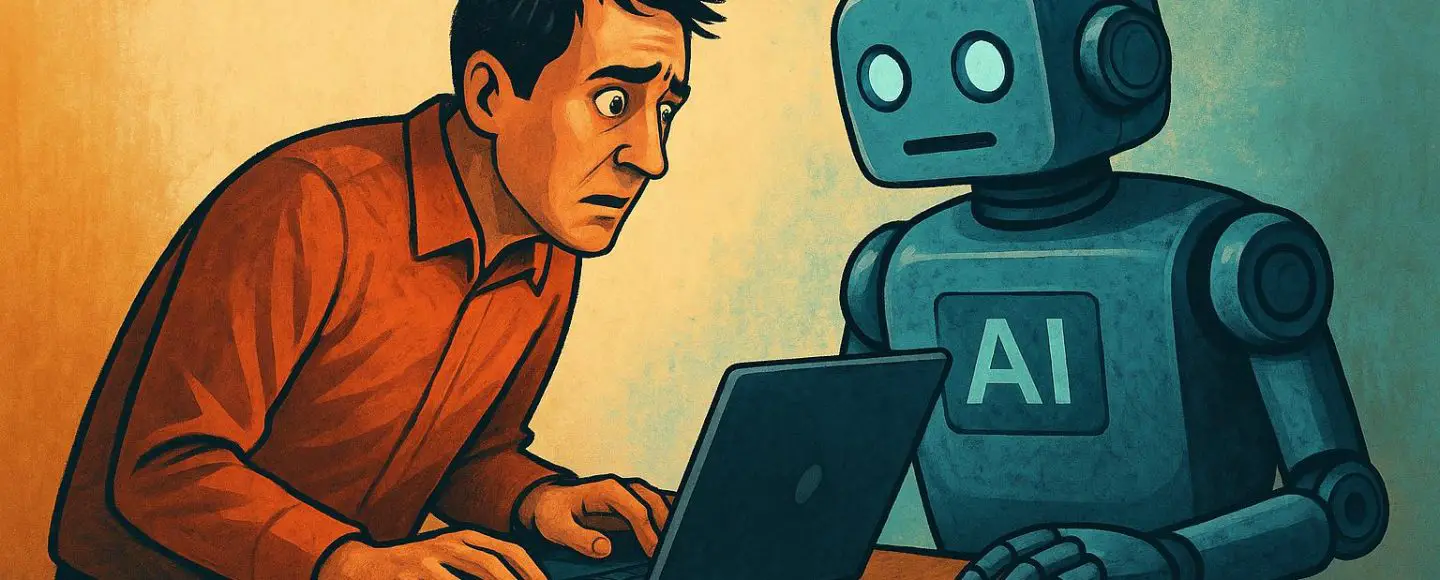

MIT Study Warns of AI Overdependence
MIT Study Warns of AI Overdependence reflects growing concerns surrounding our increasing reliance on artificial intelligence tools such as ChatGPT. A groundbreaking MIT study uncovers a significant risk: users frequently depending on AI-powered large language models could be compromising their own cognitive capabilities. The study reveals not only performance drops but a troubling erosion in critical thinking and decision-making skills. As AI asserts itself in daily workflows, particularly in high-stakes fields like journalism, healthcare, and finance, these findings press for urgent reflection on how we integrate these tools into human processes.
Key Takeaways
- MIT researchers found that frequent AI use can reduce human cognitive agility and task performance.
- Participants blindly trusted AI outputs, often missing inaccuracies or misinformation.
- The phenomenon of “automation complacency” compromises human decision quality.
- Robust AI training, oversight, and critical thinking strategies are essential to prevent overdependence.
Understanding the MIT AI Study
The Massachusetts Institute of Technology conducted a study to evaluate how people interact with AI systems when completing cognitively demanding tasks. The research centered on large language models (LLMs) like ChatGPT, assessing whether these tools supplement or inhibit human performance. Participants were split into groups, some working unaided and others using AI-generated suggestions to complete decision-based tasks in various simulated work environments.
The results were clear. Those relying heavily on AI, even when its recommendations were inaccurate or misleading, performed worse overall. Decisions became less accurate, participants demonstrated reduced critical evaluation, and cognitive shortcuts emerged. The outcomes raise critical concerns about how AI is being used as a decision crutch rather than a collaborative tool.
Automation Bias and Cognitive Impact
One of the most pressing psychological phenomena observed in the study is known as “automation bias.” This occurs when individuals defer judgment to automated systems, assuming outputs are correct without scrutiny. This was closely tied to what the researchers described as “automation complacency,” where participants became less engaged in evaluating the task at hand because they relied too heavily on AI support.
From a neuroscientific perspective, repeated automation-assisted decision-making can reduce activation in parts of the brain responsible for critical thinking and memory retrieval. While AI tools offer speed and convenience, they can inadvertently rewire how users engage with information by diminishing cognitive effort. Over time, this can result in a decreased ability to approach complex problems independently.
Risks in High-Stakes Professions
Perhaps the most alarming aspect of the MIT AI study is its implications for professionals in critical domains. In journalism, for example, previous research conducted by Stanford found that AI models trained on biased data can inadvertently reinforce misinformation. An editor relying exclusively on AI to fact-check or draft content without verifying sources risks amplifying falsehoods.
In healthcare, poor reliance on AI-generated summaries or diagnostic suggestions can be equally detrimental. The World Health Organization has cautioned against any AI system functioning without human goal-setting and oversight. Medical misdiagnoses and treatment errors can escalate rapidly if clinical professionals defer to flawed automation without rigorous evaluation.
Financial analysts and traders who over-rely on AI-predicted market trends face similar hazards. Erroneous algorithms can trigger investment decisions that cause significant financial loss. Even in corporate hiring and HR processes, algorithmic trust without human scrutiny can entrench bias or discriminatory outcomes.
Unchecked reliance on such tools highlights the broader dangers of AI dependence, especially when human oversight is minimal or absent.
Confirmation Bias in AI Contexts
Another major finding of the study relates to confirmation bias, a cognitive shortcut where individuals favor information that aligns with their existing beliefs. When AI outputs agree with a user’s assumptions, they are more likely to be accepted even when factually inaccurate. This is particularly dangerous in policymaking, scientific research, and other areas where independent analysis is essential.
Participants in the study showed a tendency to glance over contradictory data if it conflicted with the AI’s recommendation. This behavior compounded with time, illustrating how automation can train users to trust external inputs over their own judgment. Overreliance on AI not only alters workflow efficiency, it also deeply reshapes the way humans arrive at decisions.
Industry Reactions and Comparisons
Experts from other leading institutions weighed in on MIT’s findings. At Oxford’s Internet Institute, a comparative study observed similar patterns of diminished problem-solving performance in financial analysts using AI-assist platforms. Carnegie Mellon reported that customer support representatives using auto-suggest tools performed fewer quality assurance checks on responses, increasing the rate of misinformation in user communications.
MIT’s findings echo concerns previously raised in studies like self-taught AI could pose existential risks, especially if humans become passive recipients of artificially generated information.
Deborah Raji, a renowned AI ethicist, emphasized the necessity for “intelligent oversight” in human-AI collaboration. Rather than removing AI tools, her stance advocates for better integration frameworks, where human accountability remains central to all decisions.
Long-term Risks of AI Overdependence
The most insidious consequence is the long-term detriment to human cognition. Persistent reliance on generative AI tools can erode three critical faculties: situational awareness, problem-solving ability, and long-term memory engagement. When tasks are consistently automated, users may gradually forget how to perform them independently. Similar to how GPS reliance has reduced spatial orientation skills and autocorrect has lessened spelling accuracy, AI can cause comparable mental atrophy.
Workplaces adopting AI systems without fail-safes risk losing the intellectual capacity of their workforce. This raises essential questions about how future generations will learn critical thinking and decision-making in a digitally saturated environment. A related discussion can be found in this analysis of how far is too far with AI usage.
Strategies for Safeguarding Against AI Overdependence
To address the rising challenge of AI overdependence, several mitigation practices can be implemented:
- Human-AI Checkpoints: Require users to review and verify AI-generated outputs before final submission.
- AI Literacy Training: Develop internal education programs that teach professionals how AI works and its limitations.
- Accountability Structures: Make roles and responsibilities clear, assigning final decision-making authority to human team members.
- Cognitive Health Monitoring: Encourage regular assessments and feedback loops to evaluate how AI interaction affects performance over time.
Organizations must recognize that AI tools are only as trusted as the human processes surrounding them. Investing in resilient frameworks for navigating the minefield of deep fakes and misinformation builds necessary resistance against blind automation.
5 Signs You’re Relying Too Much on AI
- You implement AI outputs without reviewing for factual accuracy.
- You feel less confident making decisions without machine assistance.
- Your critical review processes have shortened or disappeared.
- You delegate tasks previously within your capability entirely to AI tools.
- You notice a drop in creativity or problem-solving when working independently.
What Professionals Should Do Next
Whether you’re in journalism, finance, tech, or healthcare, integrating AI responsibly requires cultural and operational shifts. Leaders should institute clear policies that define acceptable AI use cases, while promoting autonomy and peer review. Teams should normalize questioning AI outputs instead of treating them as definitive answers.
Maintaining cognitive sharpness in the AI age demands continual mental engagement. Exercises such as blind reviews, solving challenges without tools, or debating AI-generated suggestions can help preserve decision-making strength. As AI advances, the emphasis must remain on human cognition and judgment.
Experts worldwide continue to call for structured oversight. According to this report on experts warning against unchecked AI advancement, failing to set ethical and technical boundaries could weaken societal decision-making at scale.
Conclusion
AI overdependence poses serious risks, from shrinking human expertise to increased system vulnerability. The MIT study highlights how excessive reliance on automated systems may erode critical thinking, reduce skill diversity, and amplify errors during failure. To counter these dangers, organizations must invest in dual-strength systems that blend AI efficiency with human oversight. Cultivating a workforce skilled in both technical proficiency and strategic judgment ensures that AI serves as an amplifying tool, not a crutch. Only then can society reap innovation’s benefits without surrendering resilience.
References
Brynjolfsson, Erik, and Andrew McAfee. The Second Machine Age: Work, Progress, and Prosperity in a Time of Brilliant Technologies. W. W. Norton & Company, 2016.
Marcus, Gary, and Ernest Davis. Rebooting AI: Building Artificial Intelligence We Can Trust. Vintage, 2019.
Russell, Stuart. Human Compatible: Artificial Intelligence and the Problem of Control. Viking, 2019.
Webb, Amy. The Big Nine: How the Tech Titans and Their Thinking Machines Could Warp Humanity. PublicAffairs, 2019.
Crevier, Daniel. AI: The Tumultuous History of the Search for Artificial Intelligence. Basic Books, 1993.



